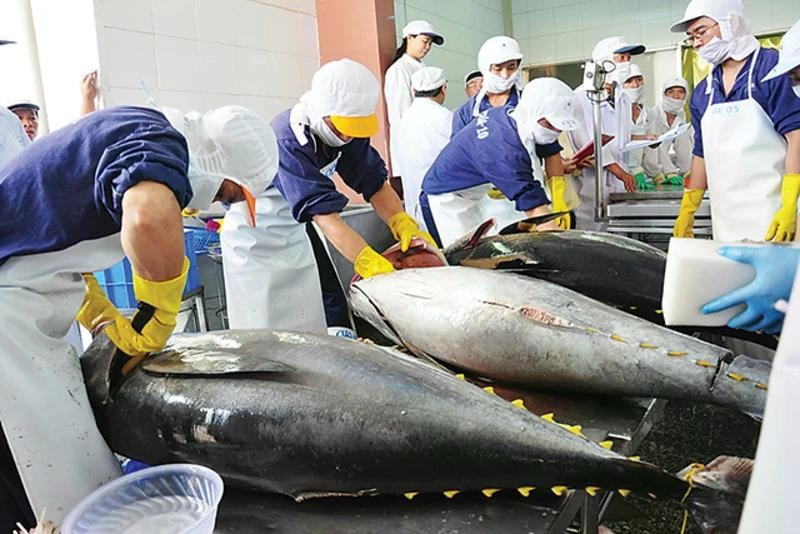Stepping up IUU “yellow card” removal: Tightened control of imported and transiting albacore tuna
With the aim of removing the IUU "yellow card," protecting marine resources, and enhancing the reputation and standing of Viet Nam’s fisheries sector on the global market, the Ministry of Agriculture and Environment has launched a new plan to inspect and control the import and transit of albacore tuna through Viet Nam’s territory via container ships.

To comply with international regulations on combating Illegal, Unreported, and Unregulated (IUU) fishing, and to protect marine resources and elevate the industry’s credibility, the Ministry of Agriculture and Environment has initiated a comprehensive plan to examine and monitor albacore tuna derived from fishing activities, covering imports, temporary imports for re-export, transshipment, and transit through Viet Nam by container vessel.
To ensure effective implementation, the Directorate of Fisheries has issued Official Dispatch No.502/TSKN-NVKN, broadly notifying relevant agencies, organisations, and enterprises, and calling for close coordination among stakeholders.
This inspection and control plan is part of Viet Nam’s commitment to international efforts to strengthen the management and conservation of albacore tuna in the North Pacific Ocean. It aligns with the FAO’s Code of Conduct for Responsible Fisheries, the International Plan of Action to Prevent, Deter, and Eliminate IUU Fishing, and the FAO Port State Measures Agreement. These frameworks emphasise the importance of ensuring the legal origin of imported seafood and preventing IUU-related activities.
To guarantee that all shipments of albacore tuna imported into or transiting through Viet Nam are of traceable and lawful origin, and are caught and transported in compliance with legal standards, the plan sets forth a series of transparent and rigorous actions. The focus is on long pectoral fin tuna sourced from fishing activities and imported into Viet Nam, specifically those classified under designated HS codes. All such shipments must be accompanied by a fishing origin certificate issued by a competent authority from the exporting country.
The Directorate of Fisheries are responsible for compiling and verifying the declaration documents, ensuring that all provided information complies with Decree No. 37/2024/ND-CP. The verification process involves checking declared data against fishing quotas, fishing areas, and species allowed to be harvested in each respective country. If the documentation meets the requirements, a notification will be issued within 48 hours of receiving a complete and valid dossier. This notification is also sent to the customs authority at the port of entry to complete customs clearance procedures.
In cases where signs of violations are detected—such as shipments originating from vessels listed as IUU or lacking valid permits—the competent authority will coordinate with customs to conduct physical inspections of the containerised cargo. These inspections will be recorded in accordance with official reporting procedures, and samples may be taken for species composition analysis if necessary.
If the inspection confirms that the shipment fully complies with the regulations, the competent authority will notify both the shipper and customs to proceed with customs clearance. Conversely, if violations are identified—such as fishing by IUU-listed vessels, lack of valid licenses, or breaches of conservation and management rules—the authorities will notify stakeholders for due handling in accordance with the law. Possible penalties may include confiscation, destruction, or mandatory re-export, depending on the severity of the violation.
Routine inspections will be conducted to ensure consistent and effective oversight of all imported and transiting shipments. The Directorate of Fisheries will lead the implementation, working closely with other relevant departments, including Department of Animal Production and Health and the Department of Quality, Processing, and Market Development. Should difficulties arise during implementation, relevant units are to report promptly to the Ministry for timely adjustments or regulatory updates.
Strict control over the origin of imported seafood not only helps protect marine resources but also supports the sustainable development of seafood processing and export businesses in compliance with international standards. These efforts play a vital role as Viet Nam aims to successfully have the IUU “yellow card” lifted by the end of 2025.








